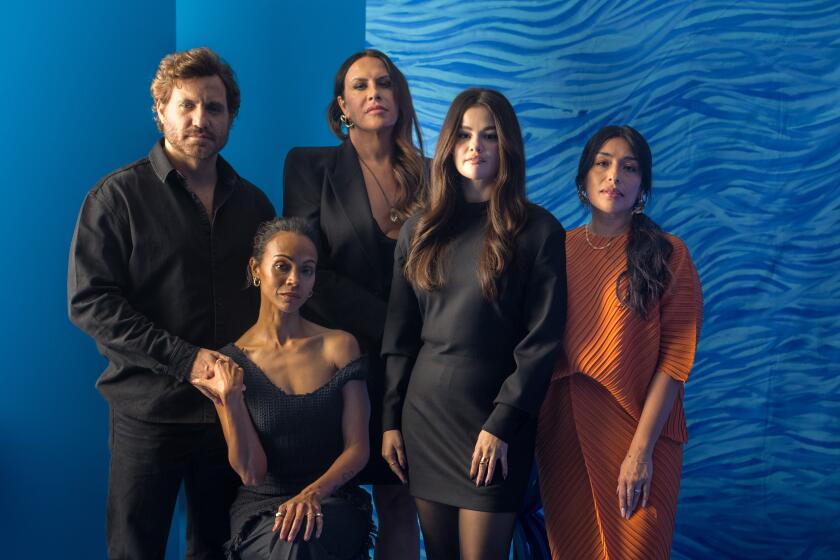‘Boonmee’ wins the Palme d’Or
CANNES, FRANCE — It was a great night for a guy named Joe, as Apichatpong Weerasethakul’s “Uncle Boonmee Who Can Recall His Past Lives,” a film as wonderfully eccentric as it sounds, won the Palme d’Or at the 63rd Festival des Cannes.
Thai director Weerasethakul, who tells people to call him Joe because of the difficulty Westerners have pronouncing his name, has made a one-of-a-kind dreamy ghost story about a man who is on speaking terms with all manner of supernatural beings.
“This is like another world for me. This is surreal,” the director said on accepting the prize at the Palais des Festivals on Sunday night. After telling jury president Tim Burton, “I really like your hairstyle,” he thanked “all the spirits and all the ghosts in Thailand. They made it possible for me to be here.”
Then Weerasethakul thanked his parents for taking him to “a little cinema in our town 30 years ago. I didn’t understand anything about film, and with this award I think I know a little more, but still it remains a mystery. This mystery keeps us coming back here to share our world.”
The Grand Prix, the festival’s runner-up award, went to “Of God and Men,” directed by France’s Xavier Beauvois, who did 2005’s “Le Petit Lieutenant.” This film is a powerful adventure of the spirit that shows how dramatic moral choices can be. Based on the real story of a Cistercian monks in a monastery in the mountains of Algeria who had to decide whether to abandon their vocation after threats from Islamic fundamentalists, “Of God and Men” is always involving and unexpectedly thought-provoking.
The best actress prize went to French star Juliette Binoche for “Certified Copy.” Binoche is charming in this otherwise tedious film set in Tuscany by Iranian art-house icon Abbas Kiarostami, the equivalent of watching a 1930s romantic comedy improbably directed by the philosopher Immanuel Kant.
The Cannes jury split the best actor award between Italy’s Elio Germano, who plays a grieving husband in “Our Life,” and Javier Bardem, star of Alejandro Gonzalez Inarritu’s “Biutiful.” Blessed with one of the most soulful faces in contemporary cinema, Bardem is easily the best thing in this epic of miserabilism, playing a petty criminal single father trying to hold his life together after a cancer diagnosis. Bardem movingly closed his thank-yous by saluting actress Penelope Cruz as “mi amiga, mi companera, mi amor.”
The festival’s jury prize went to “A Screaming Man,” directed by Mahamat-Saleh Haroun, and the first film ever in the competition from Chad. A melancholy, unassuming effort with a strong cumulative impact, it explores the interplay between a father and son during a civil war in Chad.
Politics came up elsewhere in the closing ceremony, as several speakers mentioned Jafar Panahi, the excellent Iranian director who is now on a hunger strike in an Iranian prison and whose name card was placed on an empty chair onstage as the symbolic 10th juror.
The best screenplay prize went to South Korean filmmaker and former fiction writer Lee Chang-dong for “Poetry,” a contemplative, novelistic film about a grandmother’s discovery of poetry at a critical stage of her life. The Camera d’Or for best first feature went to Michael Rowe for “Leap Year.”
Unaccountably winning the best director award was popular French actor Mathieu Amalric for his “On Tour.” Cloying and indulgent, it follows a group of American New Burlesque performers and their French producer (played by the director) as they make a desultory tour of France.
Criminally left out entirely was Mike Leigh’s masterful critical favorite “Another Year.” Starring Leigh veterans Jim Broadbent, Ruth Sheen and Lesley Manville (in a performance that should have won the actress award) as a happily married couple and their discontented friend, the film presents life through four seasons as dramatized by the hand of a master, going as thrillingly deep into character as only Leigh films can.
Another thoughtful film neglected was France’s “The Princess of Montpensier.” An especially convincing physical re-creation of the violent world of 16th century France by Bertrand Tavernier, this intelligent historical epic combines the qualities of Eric Rohmer with those of Ridley Scott.
One area where Cannes 2010 really shone was documentaries, from high-profile ones such as “Inside Job,” Charles Ferguson’s expert analysis of the recent world financial meltdown, to others that were a bit under the radar, such as the joyously improbably “Benda Bilili!,” which details the five-year journey from poverty to a triumphant European tour of a band composed of some of the most destitute inhabitants of Kinshasa, Congo.
Also one of the festival’s real areas of strength is Cannes Classics, where restored versions of great movies and film history docs (such as “Cameraman: The Life and Work of Jack Cardiff”) get the attention they deserve. The highlight this year was a digital restoration of Luchino Visconti’s three-hour version of “The Leopard,” with costars Claudia Cardinale and Alain Delon in attendance. “The Leopard’s” story of the last hurrah of an Italian prince, an epic in every sense of the word, reminded viewers, albeit unintentionally, that this kind of intelligent, magisterial filmmaking is edging toward extinction as well.
kenneth.turan @latimes.com
More to Read
Only good movies
Get the Indie Focus newsletter, Mark Olsen's weekly guide to the world of cinema.
You may occasionally receive promotional content from the Los Angeles Times.










